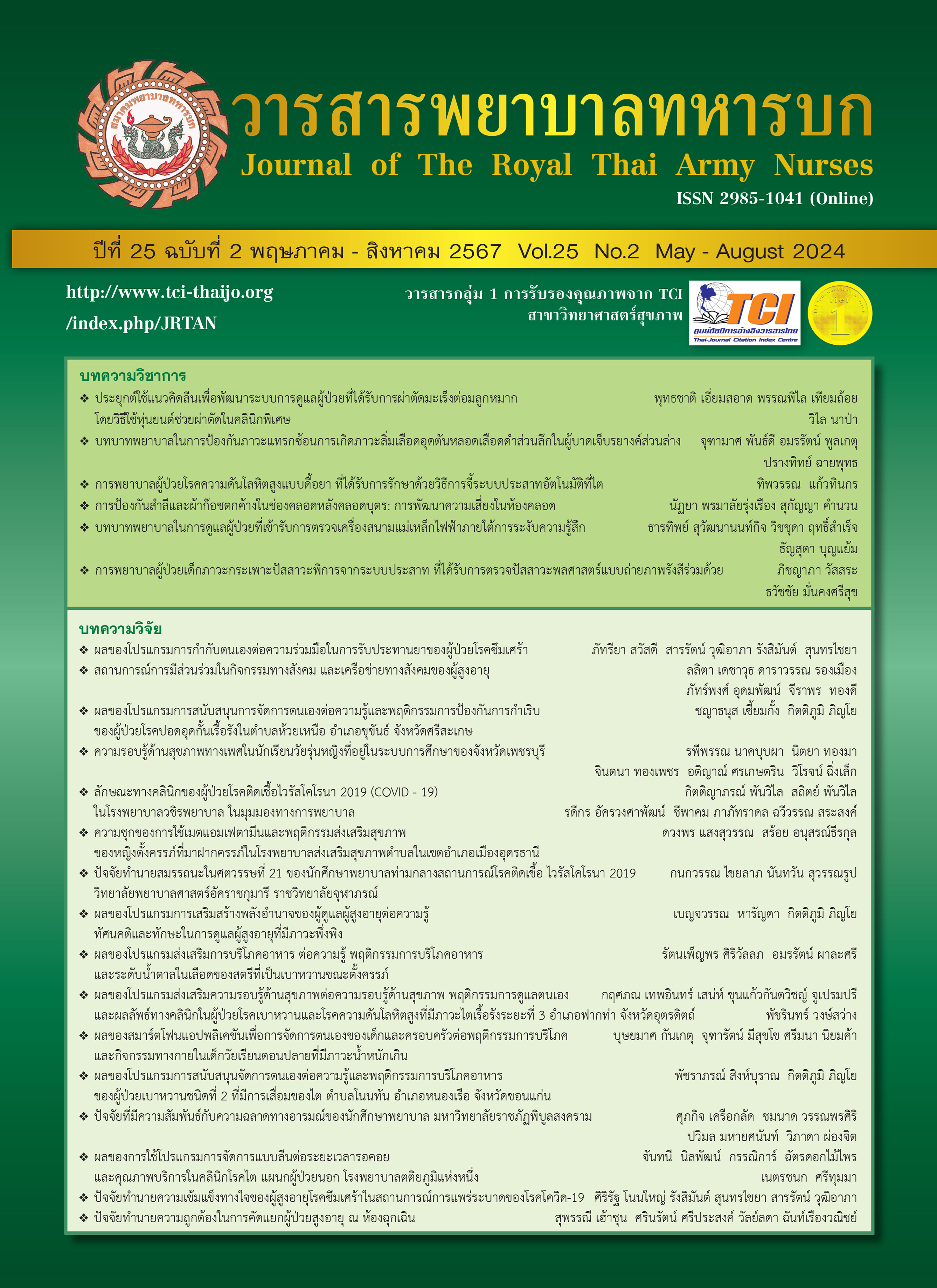Effects of Food Consumption Promotion Program on Knowledge and Food Consumption Behavior and Blood Sugar Levels in Women with Gestational Diabetes Mellitus
Keywords:
Food consumption behavior, blood sugar level, women with gestational diabetes mellitusAbstract
This study was a quasi-experimental study with 2 groups of samples. A pretest-posttest two-group design was used to compare mean scores on food consumption behavior, knowledge and blood glucose levels of women with gestational diabetes before and after the trial. And compare the average knowledge scores dietary behavior and blood sugar levels of women with gestational diabetes between the control and experimental groups after the program. The sample consisted of 36 pregnant women with gestational diabetes mellitus, divided into an experimental group and control group, 18 people in each group. Experimental instruments is a program to promote nutritional behaviors appropriate to gestational diabetes and The tools used for data collection were knowledge questionnaires on gestational diabetes, dietary behavior questionnaire and blood sugar control record form, were .8 and .84 respectively. Data were analyzed using descriptive statistics, t-tests statistics. The results showed that The average of dietary behavior and the average knowledge between the experimental group and control group after experimental were significantly different (p<.01). Mean Blood Sugar was no difference. In conclusion, the program can help promote knowledge of pregnant women. And have appropriate dietary habits Therefore, it should be applied to nursing care for pregnant women with gestational diabetes in order to effectively self-care.
Downloads
References
Netgrajang C. Strengthening Multidisciplinary Approach to Prevent and Control Complications of Diabetes Mellitus in Pregnant Women. The Journal of Prapokklao Hospital Clinical Medical Education Center. 2019; 36(2), 168-77. (in Thai)
Limruangrong P, Boriboonhirunsarn D, Puangsricharern A, Pinitlertsakun O. Factors Influencing the Occurrence of Gestational Diabetes Mellitus in Pregnant Women with Abnormal Glucose Challenge Test. Journal of Nursing Science. 2016; 34(2), 58-69. (in Thai)
Warunpitikul R, Aswakul O. The Incidence of Diabetes Mellitus in Pregnant Women and its Outcomes Between Pregnant Women with Diabetes Mellitus and Non-Diabetes Mellitus at Maharat Nakhon Ratchasima Hospital. Thai Journal of Obstetrics and Gynecology. 2014; 22(2), 81-7. (in Thai)
Suwanpakdee W, Youngwanichsetha S, Shunuan S. Effects of a Self-Efficacy Enhancement Program on Dietary and Exercise Behaviors among Pregnant Women with Gestational Diabetes Mellitus. The Southern College Network Journal of Nursing and Public Health. 2019; 6(1), 39-50. (in Thai)
Srisawat K, Sikaow O. Management for Gestational Diabetes Mellitus. Journal of the Royal Thai Army Nurses. 20114; 15(2), 50-9. (in Thai)
Kim C Berger DK, & Chamany S. Recurrence of gestational diabetes mellitus: a systematic review. Diabetes Care. 2007; 30(5), 1314-19.
Bandura A. Self-Efficacy: The Exercise of Control. W.H. Freeman and Company, New York. 1997
Hirst JE, Thach Son T, My An Thi D, Rowena F, Morris JM, & Jeffery HE. Women with gestational diabetes in Vietnam: a qualitative study to determine attitudes and health behaviours. Biomed central Pregnancy & Childbirth. 2012; 12(81), 1-10.
Bandyopadhyay M, Small R, Davey MA, Oats JJN, Forster DA, & Aylward A. Lived experience of gestational diabetes mellitus among immigrant South Asian women in Australia. [Article]. Australian & New Zealand Journal of Obstetrics & Gynaecology. 2011; 51(4), 360-4.
Thitpad C, Banchonhattakit P. Effects of Eating Behavior Program for Pregnant Women with Weight Gain during Pregnancy in ANC Clinic, Tertiary Hospital, Khon Kaen Province. Srinagarind Medical Journal. 2012; 27(4), 347-53. (in Thai)
Suvisa Parnkasem S. Exercise During Pregnancy. Journal of The Royal Thai Army Nurses 2015; 15(3), 108–13. (in Thai)
Jittrapirom A, Chareonsant J. Effectiveness of Education Provision and Relaxation Training Program on Self-care Behaviors, Blood Sugar Levels, and Stress among Gestational Diabetic Women. Nursing Journal. 2015; 42(4). 133-45. (in Thai)
Kaewpudpong K. Effects of self-care promoting program toward self-care behavior among gestational diabetic women. Medical Journal. 2018; 32(1), 907–18. (in Thai)
Thianwan Y, Nirattharadorn M, Wattana C. The Effects of a Self-care Promotion Program on Self-care Behaviors and Blood Sugar Levels among People at Risk of Diabetes. Nursing journal. 2012; 39(2). 132-43. (in Thai)
Pornkuna K, Anusornteerakul S. The Effects of Program on Knowledge, Blood Sugar Level Control and Re-admission of Women with Insulin-Dependent Gestational Diabetes Mellitus. Srinagarind Medical Journal. 2017; 32(2). 135-42. (in Thai)
Phalasri A. Predictive factors of anxiety in women with first diagnosed. Nursing journal 2015; 33(2), 15-22. (in Thai)
Pingwong K, Sittipa K. Factors Related to Self-management Behaviors Among Pregnant Women at Risk of Gestational Diabetes Mellitus. Nursing Journal CMU. 2022; 49(1), 317-28. (in Thai)
Suwannarat K, Tachasuksri T, Siriarunrat S. Effects of a Self-management Support Program on Diabetes Self-management Behavior and Blood Sugar Level in Women with Gestational Diabetes Mellitus. Journal of phrapokklao nursing college. 2019; 30(2), 1-13. (in Thai)
Downloads
Published
How to Cite
Issue
Section
License
Copyright (c) 2024 Journal of The Royal Thai Army Nurses

This work is licensed under a Creative Commons Attribution-NonCommercial-NoDerivatives 4.0 International License.
บทความหรือข้อคิดเห็นใดใดที่ปรากฏในวารสารพยาบาลทหารบกเป็นวรรณกรรมของผู้เขียน ซึ่งบรรณาธิการหรือสมาคมพยาบาลทหารบก ไม่จำเป็นต้องเห็นด้วย
บทความที่ได้รับการตีพิมพ์เป็นลิขสิทธิ์ของวารสารพยาบาลทหารบก
The ideas and opinions expressed in the Journal of The Royal Thai Army Nurses are those of the authors and not necessarily those
of the editor or Royal Thai Army Nurses Association.






